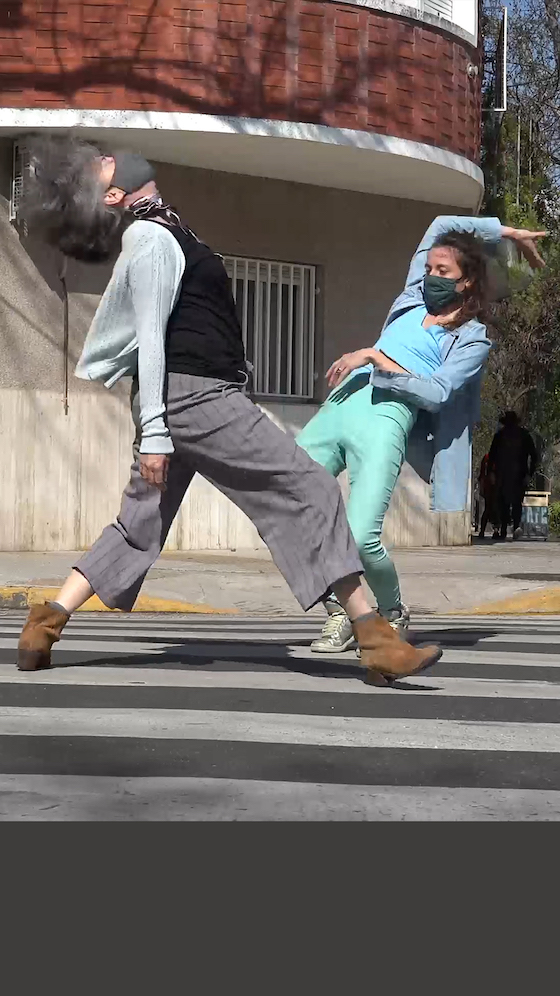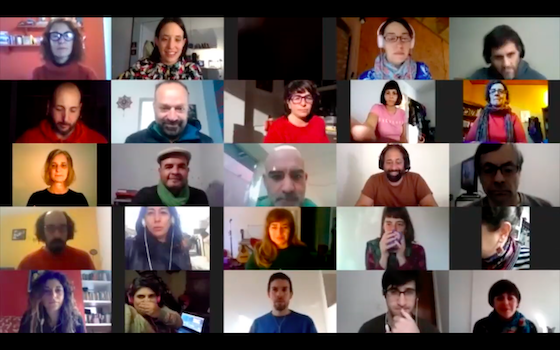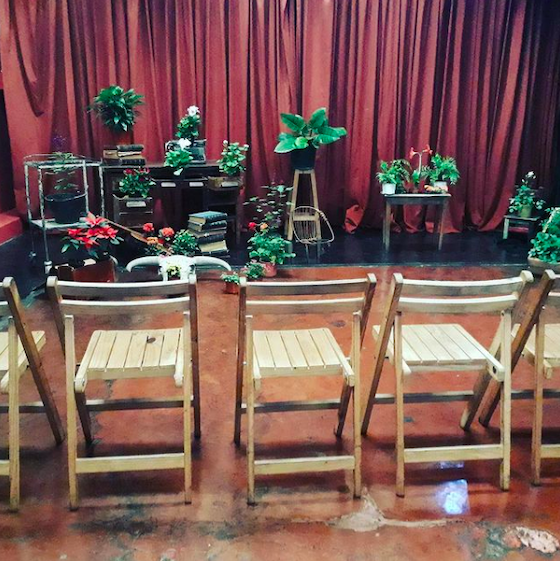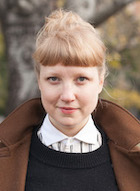Letter from Argentina - Theatre in Buenos Aires: between reinvention, assembly organization of artists and survival mode
Staying In Motion
by Natalia Laube and Mercedes Méndez
8. März 2021. Theatre in Buenos Aires is like water: it seeps into every corner, seeking new paths, always making headway. To explain the phenomenon one must first speak of a social spirit composed of thousands of creators—professionals and amateurs—who gather to create without considering the results, without planning where or how to premiere or how many people will ultimately watch. They just want to create. Theatre operates as a means to build community, to circulate artistic thought and serve as a vehicle for expression, without any certainty that the result will be money or prestige.
Teaching as a way to earn a living
The scene in Buenos Aires – the Spanish-speaking world’s capital of theatre according to the UNESCO – is composed of actors, directors, and playwrights who graduated from universities and art schools, or who learned the craft as protégés of the great masters, plus those who simply enrolled in any of the hundreds of private workshops that are available. One can choose their trajectory (formal, informal, or a mixture of the two) and which creators they wish to study with, because almost all artists, including the most renowned, offer classes: the lack of ensembles and stable jobs at State-run theatres means that teaching is a way to earn a living and ensure labour continuity.
 Performing in the streets of Buenos Aires for the dance film project "Camina, corre, baila". © Margarita BaliIn this way, a culture of independent theatre has developed in Buenos Aires, beginning and growing first and foremost through noninstitutional workshops and learning spaces, where creation and practice nourish each other—and the distinction between learning and performance work can be blurred. Students meet in classes where they inspire each other by working together and rehearsing. With more and more performances, they acquire experience and start to offer their own theatre classes to finance new projects.
Performing in the streets of Buenos Aires for the dance film project "Camina, corre, baila". © Margarita BaliIn this way, a culture of independent theatre has developed in Buenos Aires, beginning and growing first and foremost through noninstitutional workshops and learning spaces, where creation and practice nourish each other—and the distinction between learning and performance work can be blurred. Students meet in classes where they inspire each other by working together and rehearsing. With more and more performances, they acquire experience and start to offer their own theatre classes to finance new projects.
Covid-19 forced the theatre scene to a halt
This deeply-rooted practice has generated a large number of artists, theatres (around 480), students (more than 25 thousand), teachers (around 800), and stage productions, which can at times be overwhelming. At any theatre in Abasto, the most emblematic neighbourhood of independent theatre in Buenos Aires, you might one day see the work of an established artist followed the next day by a new group’s work, at a very similar price. This whole scene, in a constant state of change, can be anarchical for someone who doesn’t understand its rules, but it was all thrust into a state of shock on 20 March 2020 when the Argentine government established a strict lockdown.
As coronavirus cases grew in Argentina despite the cancelation of all activities, and it started to become clear that the pandemic would not disappear overnight, so grew concerns: performing artists were not only going to lose projects, but also the possibility to teach, the primary source of funds for most. And this in a country where it is hard to guarantee any form of sustained State-led aid.
Organized support from the scene for the scene
However, it was not long before the Argentine society’s logic of permanent assembly, deriving from its strong union culture, surfaced as an alternative, collective way out of the disaster. By May 2020, the PIT (Profesorxs Independientes de Teatro [Independent Theatre Teachers]) had formed, operating in a scene that already had several associations of independent theatre workers, actors, producers. The PIT initiative, initially a WhatsApp group, grew to have more than 800 contacts within a few days. As the number of participants grew, so did their organizing, with a list of emergencies to attend to: commissions were created to manage and deliver food to people with pressing economic needs, technology groups to assist those lacking the tools to give virtual classes, and communication groups to disclose all the work being done.
 Virtual meetings of PIT (Profesorxs Independientes de Teatro – Independent Teachers of Theater) in 2020. © PIT
Virtual meetings of PIT (Profesorxs Independientes de Teatro – Independent Teachers of Theater) in 2020. © PIT
Theatre teachers shared their computers, webcams, and paid Zoom accounts. From uneasiness due to lack of work to ethical and aesthetic debates on teaching theatre over Google Meet: everything was discussed at the endless PIT meetings. In 2020, PIT not only published a digital magazine, it also organized a virtual festival, published a manifesto, and met with public officials to demand a reactivation of theatre activities, subsidies, and cultural policies given the scale of the tragedy.
Standing up for on-site theatre
Independent theatre artists were the first – before politicians, retailers, or restaurants – to draft a protocol for measures that could take theatre out of confinement. They devised a plan for how to give acting classes and bring back face-to-face performances. They designed exercises for actor training in which no contact was needed and in which a rigorous two-meter distance could be maintained. "I don’t understand why it seems more terrible to imagine this than to have to resign ourselves to live through a screen", said the playwright and director Matías Feldman after the mandatory social isolation had been decreed. "I’m worried by the fact that virtual solutions seem easier than finding a way to resume real life," he added.
"The specificity of theatre is its convivial condition; virtual theatre is an oxymoron; it clearly does not exist. These recordings watched on cell phones cannot be the future. Theatre that was already made can be broadcast on phones, but creating new works this way would be like producing rather deteriorated audio-visuals because you would not even be able to enjoy the benefits of the cinema, in terms of its production, grammar, and editing," added the playwright, actor, and director Rafael Spregelburd.
 During the lockdown, the independent theatre Sportivo Teatral became a plant shop. © Sportivo Teatral
During the lockdown, the independent theatre Sportivo Teatral became a plant shop. © Sportivo Teatral
Ricardo Bartís, one of the greatest figures of the independent Argentine scene, thinks along the same lines. Bartís has been giving classes and putting on his own plays for more than thirty years at Sportivo Teatral, located in the Palermo neighbourhood. "Our activity involves exchanging the flow of energy. It requires that we can yell, be close to and kiss each other on stage. That’s why, given this situation, we have two options: either we do melancholic theatre that refers to what one could do before the pandemic, or at some point, if this persists, we decide to run the risk of infecting each other," he said. A few months ago, and given the impossibility of covering the costs of the theatre, the patio of Sportivo became a shop selling plants, flowers, and herbs: Bartís, who adores botany, preferred to seek out alternative ways to sustain his space rather than pursue any art form that was not on-site theatre, although he will give online classes in 2021.
Digital experiments of theatres and festivals
Other directors and managers, by contrast, used this period for experimentation. Timbre 4, led by the playwright and director Claudio Tolcachir, was one of the first theatres that dared to start having virtual experiences. The festival Temporada Alta [High Season], which acts as a bridge every summer between Argentine and Spanish theatre, will be online this year with various transoceanic proposals. FIBA, the city’s emblematic theatre festival, had occured at the end of February, before the virus’s resurgence, anticipated to occur when autumn arrives in the summer hemisphere. The FIBA line-up is sending out an open call for three divisions: plays that have already premiered, plays to be premiered (prioritizing proposals in open spaces), and digital projects created during quarantine: twenty projects were chosen from among hundreds. What we won’t see is any travel from abroad: international proposals will be performed online or adapted using local casts.
Theatres reopened at the end of Argentina’s spring season with a certain degree of caution and with the same conflicting emotions felt at theatres in European capitals back in May 2020 – glad to return, but also the inevitability of a false sense of normalcy, with empty seats, face masks, temperature measurement and affidavits upon admission. The ever-growing sensation is that the pandemic has placed us in a time of convergence theatre. This concept is described by Henry Jenkins in his book Convergence culture meaning that new media does not supplant the old, but rather the logistics of coexistence becomes more complex (it’s not about choosing between the radio and a podcast, paper newspapers or the Internet: consumers turn on the television at the same time they are commenting on Twitter about what they are watching). Virtual theatre will not replace live theatre and no one will have to choose between outdoor performances or shows on Zoom. The immediate future seems able to include all options: theatre will live in football pitches, in squares, amphitheatres, performances, and artistic careers in neighbourhoods, coexisting with "traditional plays" made possible by the dictates of the time: this will be, for now, the only way to keep the water flowing.

 Natalia Laube was born in Buenos Aires, where she studied journalism and art history. She works as a cultural journalist, cultural manager and translator from German. She lives and works between Berlin and Buenos Aires. (Photo, right: Coni Rosman)
Natalia Laube was born in Buenos Aires, where she studied journalism and art history. She works as a cultural journalist, cultural manager and translator from German. She lives and works between Berlin and Buenos Aires. (Photo, right: Coni Rosman)
Mercedes Méndez is a journalist and art critic, specializing in theater. She writes for the main newspapers and news sites in Buenos Aires and coordinates a popular theater club. (Photo, left: Soledad Gryciuk)
This article is part of a cooperation between the International Research College "Interweaving Performance Cultures" at Freie Universität Berlin (editor: Clara Molau) and nachtkritik.de.
![]()
Für Horizonterweiterung
Der Blick über den eigenen Tellerrand hinaus ist uns wichtig. Wir möchten auch in Zukunft über relevante Entwicklungen und Ereignisse in anderen Ländern schreiben. Unterstützen Sie unsere internationale Theaterberichterstattung.